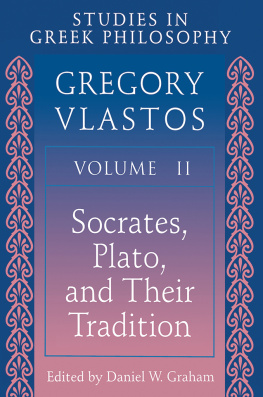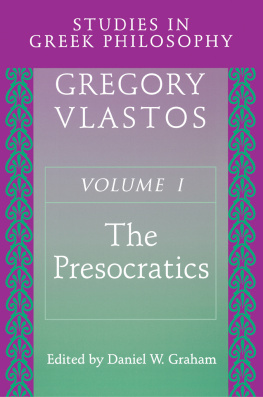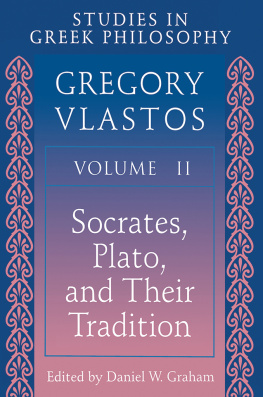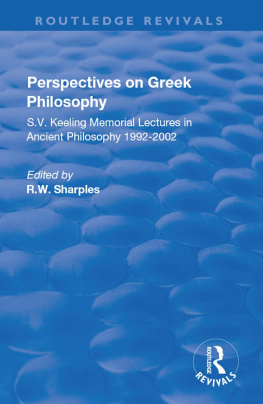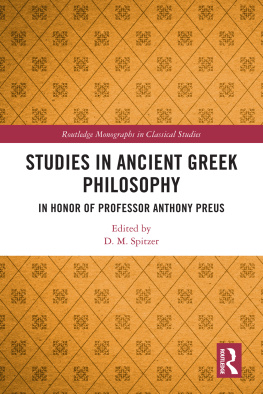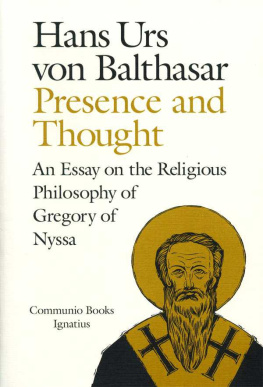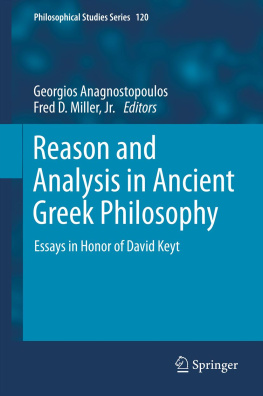STUDIES IN GREEK PHILOSOPHY
VOLUME II: SOCRATES, PLATO, AND THEIR TRADITION

Gregory Vlastos
STUDIES IN GREEK PHILOSOPHY
GREGORY VLASTOS
VOLUME II: SOCRATES, PLATO, AND THEIR TRADITION
Edited by Daniel W. Graham
PRINCETON UNIVERSITY PRESS
PRINCETON, NEW JERSEY
Copyright 1995 by Princeton University Press
Published by Princeton University Press, 41 William Street,
Princeton, New Jersey 08540
In the United Kingdom: Princeton University Press, Chichester, West Sussex
All Rights Reserved
Library of Congress Cataloging-in-Publication Data
Vlastos, Gregory
Studies in Greek philosophy / Gregory Vlastos.
p. cm.
Includes bibliographical references and indexes.
Contents: v.1. The Presocratics v.2. Socrates, Plato, and their tradition.
ISBN 0-691-03311-0
ISBN 0-691-01938-X (pbk.)
1. Philosophy, Ancient. I. Graham, Daniel W. II. Title.
B171.V538 1994 180dc20 94-3112
This book has been composed in Times Roman
Princeton University Press books are printed on acid-free paper and meet the guidelines for permanence and durability of the Committee on Production Guidelines for Book Longevity of the Council on Library Resources
Printed in the United States of America
10 9 8 7 6 5 4
CONTENTS
ACKNOWLEDGMENTS
T HE PAPERS in this volume were previously published as noted below. The editor and the heirs of Gregory Vlastos gratefully acknowledge the permission to reprint granted by the agencies indicated.
1. The Paradox of Socrates
Queens Quarterly 64 (195758): 496516
Copyright, the heirs of Gregory Vlastos
2. Platiss Socrates Accusers
AJP 104 (1983): 2016
The Johns Hopkins University Press, Baltimore.
3. Brickhouse and Smiths Socrates on Trial
TLS, No. 4, 524, Dec. 15, 1989, p. 1393
Times Literary Supplement, London.
4. Socrates on Political Obedience and Disobedience
Yale Review 63 (1974): 51734
The Yale Review, Copyright Yale University, New Haven.
5. Socrates on Acrasia
Phoenix 23 (1969): 7188
The Classical Association of Canada, Toronto.
6. Was Polus Refuted?
AJP 88 (1967): 45460
The Johns Hopkins University Press, Baltimore.
7. The Theory of Social Justice in the Polis in Platos Republic
Helen North, ed., Interpretations of Plato: A Swarthmore Symposium
(Leiden: E. J. Brill, 1977), Mnemosyne, Suppl. vol. 50: 140
E. J. Brill, Leiden, The Netherlands.
8. The Rights of Persons in Platos Conception of the Foundations of Justice
H. Tristram Englehardt, Jr., and Daniel Callahan, eds., Morals,
Science and Society (Hastings-on-Hudson, N.Y.: The Hastings Center, 1978), pp. 172201
Copyright The Hastings Center, Briarcliff Manor, N.Y.
9. The Virtuous and the Happy: Irwins Platos Moral Theory
TLS, No. 3, 961, Feb. 24, 1978, pp. 23031
Times Literary Supplement, London.
10. Was Plato a Feminist?
TLS, No. 4,485, March 17, 1989, pp. 276, 28889
Times Literary Supplement, London.
11. Anamnesis in the Meno
Dialogue 4 (1965): 14367
Dialogue, by the Canadian Philosophical Association, Ottawa.
12a. The Third Man Argument in the Parmenides
PR 63 (1954): 31949
In the public domain, as certified by the managing editor, The Philosophical Review, Cornell University, Ithaca, N.Y.
12b. Addendum to the Third Man Argument in the Parmenides
R. E. Allen, ed., Studies in Plato's Metaphysics (Routledge & Kegan Paul, 1965), pp. 26163
Routledge, London.
12c. Addenda to the Third Man Argument: A Reply to Professor Sellars
PR 64 (1955): 43848
In the public domain.
12d. Postscript to the Third Man
PR 65 (1956): 8394
In the public domain.
13. On a Proposed Redefinition of Self-Predication in Plato
Phronesis 26 (1981): 7679
Van Gorcum, Assen, The Netherlands.
14. The Role of Observation in Platos Conception of Astronomy
J. P. Anton, ed., Science and the Sciences in Plato (Delmar, N.Y.: Caravan Books, 1980), pp. 131
Caravan Books, Delmar, N.Y.
15. Disorderly Motion in Platos Timaeus
CQ 33 (1939): 7183
Oxford University Press, Oxford.
16. Creation in the Timaeus: Is It a Fiction?
R. E. Allen, ed., Studies in Platos Metaphysics (London: Routledge & Kegan Paul, 1965), pp. 40119
Routledge, London.
17. A Note on the Unmoved Mover
PQ 13 (1963): 24647
Blackwell Publishers, Oxford.
18. Minimal Parts in Epicurean Atomism
Isis 56 (1965): 12147
The University of Chicago Press, Chicago.
19. Zeno of Sidon as a Critic of Euclid
Luitpold Wallach, ed., The Classical Tradition: Literary and Historical Studies in Honor of Harry Caplan (Ithaca, N.Y.: Cornell Univ. Press, 1966), pp. 14859
Copyright 1966 by Cornell University. Used by permission of the publisher, Cornell University Press, Ithaca, N.Y.
Essay (1) was reprinted in Gregory Vlastos, ed., The Philosophy of Socrates (Doubleday and Co., 1971). Essays (12a), (12d), and (15) were reprinted in R. E. Allen, ed., Studies in Plato's Metaphysics (London: Routledge & Kegan Paul, 1965). My thanks to Doubleday and to Routledge for permission to print revisions to the essays made in the reprints.
INTRODUCTION
U NLIKE THE FIRST VOLUME of this collection, which contains all Vlastos major discussions of Presocratic philosophy, the present volume contains only a fraction of the authors discussions of Socrates and Plato. His Platonic Studies; Socrates, Ironist and Moral Philosopher; and Socratic Studies comprise much of his major work on these two philosophers. Nevertheless, the present volume fills major gaps in his other collections and shows the wide range of his interest and ability.
The Paradox of Socrates, originally a lecture for a general audience, provides Vlastoss first extended statement on the Socratic Problem, i.e., the problem of how to reconstruct the views of the historical Socrates from the ancient evidence. We must rely on Platos Socratic dialogues as the source for Socrates, for only Plato can account for the data. Platos Socrateswhose conversations Plato fictionally recreates, rather than documentinghas a complex view of how to save Athenian souls. In a discussion that anticipates much of his later interpretation of Socrates, Vlastos sketches salient points of Socrates method and philosophy and in a famous passage criticizes him for a failure of love. This essay is still one of the best introductions to the paradox of Socrates.
In his review of E. N. Platiss Socrates Accusers, Vlastos shows his knowledge of and interest in the prosopography of Socrates accusers. Reviewing Brickhouse and Smiths Socrates on Trial, he dissents from the authors on the important role they assign to the daimonion in Socrates thought. In Socrates on Political Obedience and Disobedience, Vlastos discusses the argument of the Crito and attempts to locate Socrates position between the extremes of passive obedience and political disobedience.

